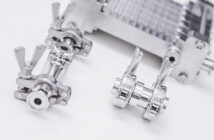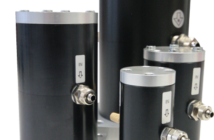
CEO of Bio Fence, Ofer Shoham
A topcoat that creates more hygienic surfaces could soon be a game-changer for New Zealand food manufacturers.
A pilot undertaken by Bio-Fence has shown that all traces of listeria spp was eliminated in a highly sensitive food production environment. The product works by adding an innovative polymer to a topcoat that binds disinfectant to the surface.
Bio-Fence is an Israeli health and food-tech start-up founded in early 2018. The company is currently in discussion with a major food manufacturer that has a market-leading presence in New Zealand but cannot disclose which manufacturer at this stage.
“Unsafe foods lead to hundreds of millions of lives and hundreds of billions of dollars lost each year, with listeria a major food-related health risk worldwide,” says CEO of Bio Fence, Ofer Shoham.
“New Zealand is a unique market, given 90% of its food is exported and food and beverage manufacturing, including meat manufacturing, is so crucial to the country’s economy. Yet in recent years we have seen salads, sandwiches, wraps, milk, and RTE (ready-to-eat) meat products being recalled in New Zealand due to listeria outbreaks. These outbreaks are therefore not only a public health risk but potentially a considerable economic threat too.”
The 11-week proof of concept saw Bio-Fence antimicrobial coatings applied to the floor and lower part of walls of a hot dog peeling room in a major sausage manufacturing facility in Israel. Despite repeated, strict cleaning and disinfection routines, the facility had a continuous pre-pilot presence of listeria sp, particularly on the production floor.
During the three-week control phase prior to the application of the Bio-Fence coating, listeria was detected in 21 out of 23 (91%) daily floor samples; following the application of the Bio-Fence coating, listeria was completely undetectable on the floor surface during day-to-day production.
Results from the pilot also show a dramatic reduction of up to 99.9999% in the level of gram-negative bacteria as demonstrated by Enterobacteria (EB) readings, and a considerable improvement in hygiene levels as demonstrated by Total Count (TC) readings. Exactly the same cleaning and hygiene routines, involving a chlorine-based product, were practiced before and after the Bio Fence application.
“Our pilot completely eliminated listeria in a high-risk food production environment, and we believe there is great potential for the Bio Fence solution in New Zealand given its status as a leading food manufacturer. We are in conversation about supplying our technology to a market-leading food production company in New Zealand and have plans to expand more broadly into the New Zealand market soon,” says Shoham.
Environmental pathogens within the food production process remains one of the greatest risks to food safety, with the presence of these bacteria in the production environment directly linked to the contamination of food.
The hot dog peeling room was specifically selected for the pilot as it poses a series of complex challenges to maintaining hygiene levels; the production environment includes low temperatures, humidity, condensation, and heavy movement of workers and equipment – all conditions under which listeria can thrive.
Despite the pilot taking place under heavy organic load and wet conditions, the results demonstrate that Bio-Fence technology, when embedded in an industrial topcoat, can serve as a powerful anti-microbial solution that stabilises and prolongs the activity of standard sanitisers, thereby helping dramatically reduce the spread of listeria.
As a result of the successful proof of concept, the manufacturing facility has continued to use Bio-Fence’s antimicrobial coatings and is now looking to expand the use of the coating in other areas of the facility.
“Dealing with environmental pathogens like listeria, salmonella, and others in food production processes is a continuous struggle for food manufacturers, especially in the production of sensitive food defined as RTE,” Shoham says.
“There is a direct link between the presence of these bacteria in the immediate environment of production equipment and the contamination of food products. Sadly, thousands of people are still infected by listeria every year, causing a mortality rate of more than 25%.
“We are hugely encouraged by the breakthrough results of this pilot, which independently demonstrates the efficacy of the Bio-Fence product in helping eliminate listeria. We are convinced, as demonstrated by the POC results, that our technology can cut the path of infection and improve the overall hygiene level in food production.
“We look forward to using this trial as a basis to employ our product and technology into other highly sensitive food production environments.”




























































































